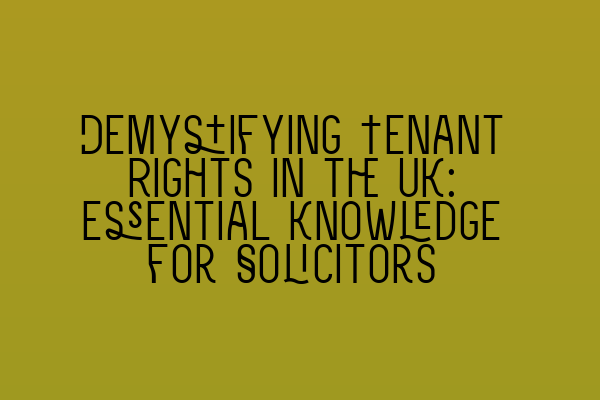Demystifying Tenant Rights in the UK: Essential Knowledge for Solicitors
As a solicitor practicing in property law, it is crucial to have a comprehensive understanding of tenant rights in the UK. The legal landscape surrounding tenancies can be complex and multifaceted, requiring expertise and up-to-date knowledge in order to provide effective legal representation to clients. In this blog post, we will delve into the essential aspects of tenant rights, providing you with key information that will empower you in your role as a solicitor.
Understanding the Different Types of Tenancies
A significant part of demystifying tenant rights lies in understanding the different types of tenancies that exist in the UK. As a solicitor, it is important to be familiar with the distinctions between assured shorthold tenancies, secure tenancies, and regulated tenancies. Each type of tenancy comes with its own unique set of rights and responsibilities, and being well-versed in this area will enable you to provide accurate advice to your clients.
Assured Shorthold Tenancies
Assured shorthold tenancies (ASTs) are the most common type of tenancy in the UK. They provide tenants with a minimum occupancy period of six months and typically grant them the right to live in the property for a fixed term. ASTs offer a certain level of flexibility for both landlords and tenants, but it is essential to understand the specific regulations surrounding these tenancies. This knowledge will allow you to address any issues that may arise during the tenancy period, such as lease renewals, rent increases, or potential evictions.
Secure Tenancies
Secure tenancies are most commonly associated with social housing, such as council or housing association properties. They offer tenants a high level of security of tenure, with the right to remain in the property for life. Understanding the rights and obligations of both tenants and landlords in secure tenancies is crucial for ensuring that your clients are protected and informed throughout their tenancy.
Regulated Tenancies
Regulated tenancies are a more niche area of tenant rights, but one that solicitors must be knowledgeable about. These tenancies originated before 1989 and provide tenants with the strongest level of security of tenure. Solicitors advising clients who are either tenants or landlords in regulated tenancies must have a thorough understanding of the unique regulations that govern these types of tenancies.
Key Legal Obligations for Landlords
In order to fully advise your clients on tenant rights, it is essential to have an in-depth understanding of the legal obligations that landlords must adhere to. Some of the key obligations include:
1. Providing a safe and habitable property: Landlords have a legal obligation to ensure that the property is safe and meets certain standards of habitability. This includes maintaining proper ventilation, ensuring electrical safety, and addressing any necessary repairs in a timely manner.
2. Protecting the tenant’s deposit: Under the Tenancy Deposit Protection (TDP) scheme, landlords are required to protect their tenant’s deposit in a government-approved scheme. As a solicitor, it is important to understand the requirements of this scheme and be able to advise clients accordingly.
3. Serving proper notice for eviction: If a landlord wishes to evict a tenant, they must follow the proper procedures and serve the correct notice. Understanding the eviction process and the specific notice periods required is essential for ensuring that your client’s rights are protected.
Tenant Rights and Protections
Equally important as understanding the obligations of landlords is having a deep knowledge of tenant rights and protections. Tenants in the UK are afforded various rights, including:
1. Right to a written tenancy agreement: All tenants have the right to receive a written tenancy agreement that outlines the terms and conditions of their tenancy. This document is crucial for establishing clear expectations and protecting the rights of both parties involved.
2. Right to a safe and habitable property: Tenants have the right to live in a safe and habitable property. If the landlord fails to meet their obligations in this regard, tenants have the right to request repairs and seek legal remedies if necessary.
3. Protection against unfair eviction: Tenants are protected against unfair eviction and illegal eviction. Solicitors must be well-versed in the eviction laws and procedures to ensure that their clients are not unlawfully removed from their rental property.
Staying Informed and Continuing Professional Development
In the ever-changing field of property law, it is crucial for solicitors to stay informed and continuously develop their knowledge and skills. As a specialist solicitor at SQE Property Law & Land Law, you can access a range of resources and courses to enhance your understanding of tenant rights and other areas of property law. Stay up-to-date with SQE 1 Practice Exam Questions, SQE 1 Practice Mocks FLK1 FLK2, SQE 2 Preparation Courses, SQE 1 Preparation Courses, and SRA SQE Exam Dates to ensure that you are equipped to provide the best possible service to your clients.
Final Thoughts
Tenant rights in the UK are a significant aspect of property law, and solicitors must have a robust understanding of this area in order to effectively advise their clients. By familiarizing yourself with the different types of tenancies, legal obligations for landlords, and tenant rights and protections, you will be well-equipped to navigate the intricacies of tenant rights. Continue to seek out opportunities for professional development and stay informed about the latest developments in this field, ensuring that you can provide the highest level of service to your clients as a solicitor at SQE Property Law & Land Law.
